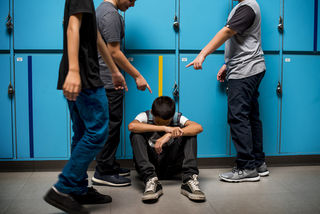Bullying
Can Wisconsin Get Rid of Bullies by Fining Their Parents?
Impossible solutions are pursued while the best are being ignored
Posted June 13, 2019

For a few years, Wisconsin has been making headlines throughout the nation with their ordinances that fine parents hundreds of dollars if their children are bullies. If Wisconsin's fines succeed in getting rid of bullying, other municipalities will eagerly follow suit. Fining parents of bullies would revolutionize the war against bullying.
The most attention-getting article about Wisconsin, titled “Your Child Bullied Someone? That’ll Cost You $313”, by Nicholas Bogel-Burroughs, appeared in the New York Times on June 11.
Bogel-Burroughs focuses on the case of Darren O’Brien, a father whose three children have all been victims of bullying in school. Mr. O'Brien is hoping that fining the parents of bullies will finally bring relief to his children. Countless other parents harbor the same hope.
Bogel-Burroughs has uncovered that:
Wisconsin Rapids, in the central part of the state, is not alone in looking to parents to solve the vexing problem of bullying... Several other municipalities, and at least one state legislature, have considered fining — or even jailing — parents whose children bully.
Where such legislation has passed, though, the penalties are rarely imposed. Local officials compared the ordinances to truancy laws, acting as deterrents rather than punishments.
And…
The Wisconsin Rapids legislation is modeled on a 2015 bill passed by Plover, Wis., a village that approved one of the first bullying bills aimed at parents. Since then, Plover police have sent fewer than a dozen warning letters to parents and have never imposed the $124 fine.
This is important. Despite the humungous interest in the Wisconsin bullying fines, the fines have never been implemented. Why all the attention, then, showered on Wisconsin? Why does Wisconsin regularly publicize their anti-bullying-fine initiatives? How can other places decide to follow Wisconsin’s example if Wisconsin doesn't follow it?
Why isn't research being done?
But there is a more obvious question that no one seems to be asking. The bullying field has taught us that schools should only use research-based interventions. Why, then, isn’t there any research being done on the effectiveness of fining parents of bullies? Wisconsin could easily have done this by now. And why do news media publish stories of the Wisconsin laws as though they may be the wave of the future in bullying prevention without demanding to see scientific evidence of their effectiveness?
The likely reason for the absence of demand for such a study is that few people think it is necessary. Most people are so convinced that punishment is the solution to bullying that they are excited about the idea of fining parents of bullies. Why bother with studies? And politicians want votes, so they pass these laws to make their constituents happy. As the Times article informs us:
Mr. O’Brien said he was not sure how much the Wisconsin Rapids proposal would help his three daughters, but he is eager to see it pass when it goes up for a vote next week.
“If it starts costing the parents a couple hundred bucks every time their kid bullies somebody, maybe that will change the course of action,” he said. “Something has to be done.”
Fortunately, The New York Times is not your typical newspaper. It demands more from its reporters. So Bogel-Burroughs did some investigation, leading to his discovery that the fining laws aren’t being implemented. Thus, the rest of the country and the world have nothing to learn from Wisconsin despite its three years of hyping its groundbreaking law.
An expert opinion on fining parents
Bogel-Burroughs also isn’t willing to mindlessly disseminate the innovative Wisconsin initiative as the long-awaited wondrous antidote to the scourge of bullying, so went a little further. He questioned an expert on her views of the law:
Dr. Amanda Nickerson, who directs the Alberti Center for Bullying Abuse Prevention at the University at Buffalo, said she was skeptical that being fined would suddenly motivate parents to become involved in changing their child’s behavior. She said the key to engaging parents was to set up meetings between them and teachers to discuss how to encourage good behavior, before seeking any kind of penalty.
When the authorities fine parents over bullying, “there’s a lot of steps in between punishment and behavior change in the child that are missing,” Dr. Nickerson said. Without those intermediate steps, “the parent is probably going to be angered and think that the schools or the courts are being ridiculous or overblown.”
Yes, Dr. Nickerson is not so naïve as to believe that fining parents is the missing key to stopping children from being bad.
Additional questions that should be asked
However, the public deserves that we ask even more questions. The basic assumption of the anti-bullying field is that schools must protect children from bullying and need to implement interventions that make children stop doing it. But isn’t that precisely what the anti-bullying field has been trying to do for a few decades? And hasn’t bullying continued unabated, with states continually trying to figure out how to formulate effective anti-bullying measures, and with the suicide rate of bullied kids constantly escalating?
Why is no one else (other than yours truly) asking if anti-bullying policies may be making the bullying problem worse? Why do no researchers report the percentage of bullying situations that worsen as a result of anti-bullying programs and policies, something that should be a cinch to do? Doesn't anyone, including the unfortunate Mr. O’Brien, not to mention the researchers, notice that informing the schools when their children are bullied tends to make the problem even worse? Instead of accusing schools of doing nothing, or not enough, to make children stop being bullied, why don’t they consider that the schools are telling the truth when they insist they have zero-tolerance policies for bullying and are properly following mandated procedures? Why does everyone expect the policies to work when the research shows that they don’t?
The simple reason anti-bullying policies backfire
It is simple to understand how anti-bullying policies can worsen situations. No one likes to be accused of a crime or to have their children accused of a crime, so it is natural to defend oneself and to blame one’s accusers. Trials do not create reduce hostilities between litigants. They intensify them. The same thing happens when schools act as courts of law between children.
Adding fines to the consequences do not make the people give up the fight against charges. It makes them fight harder. If you get a driving violation, when will you fight it more intensively? When it is a mere slap on the wrist–a reprimand–or when you are ordered to pay hundreds of dollars? Well, it’s no different if parents face fines of hundreds of dollars because their child is accused of being a bully. Few parents want their children to get official records as bullies, and they don’t want to pay hefty fines, either. Any parent that would fight charges that their child is a bully will fight even harder if the charges contain a fine.
(For a deeper understanding of why fining parents can't work. Read Why Fining Parents for Bullying Will Intensify Hostilities)
The most important question
And the most important question of all is, why aren’t our bullying experts, our educators, and our legislatures considering that the best solution to bullying is to teach kids how to handle it on their own? It is obvious that if kids know how to effectively defuse bullying by themselves, the school does not need to protect them from each other and to conduct hostility-arousing investigations, interrogations, court trials and punishments. Wouldn’t Mr. O’Brien prefer that his children be taught the skills for solving their social problems than to have their suffering escalate because anti-bullying policies are counterproductive?
But the reason the obvious solution is not being pursued is simple. No expert today wants to be accused of “blaming victims.” It can be a professional death sentence. According to the anti-bullying dogma, only the bully has anything to do with the bullying situation, and only the bully can be required to change. Suggesting that a victim do anything to solve their problem other than informing the authorities is tantamount to victim-blaming. Thus, the bullying problem continues endlessly, while our experts and our legislators fruitlessly wrack their brains out trying to figure out how to create anti-bullying policies that will finally get rid of bullies. (Read Fear of "Blaming Victims" Perpetuates Bullying Epidemic.)
And Mr. O’Brien’s children, along with millions of other victims of bullying, will continue to pay the price.




